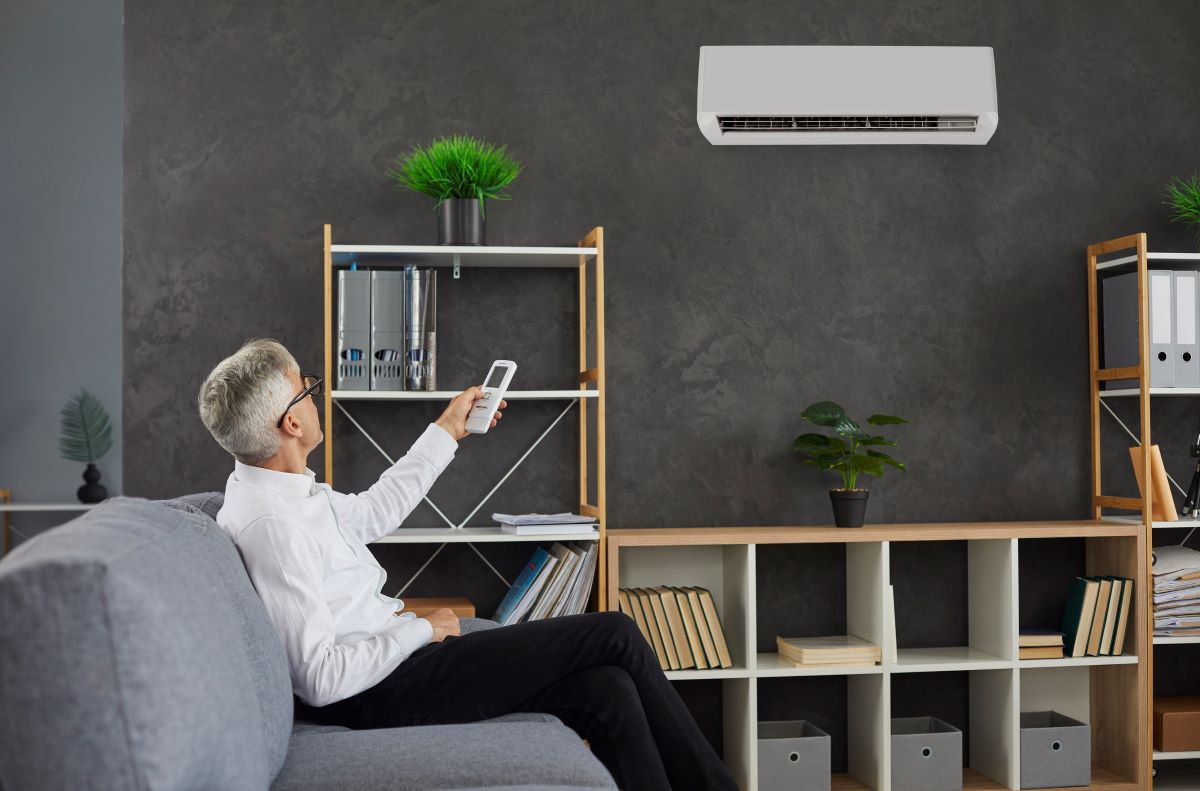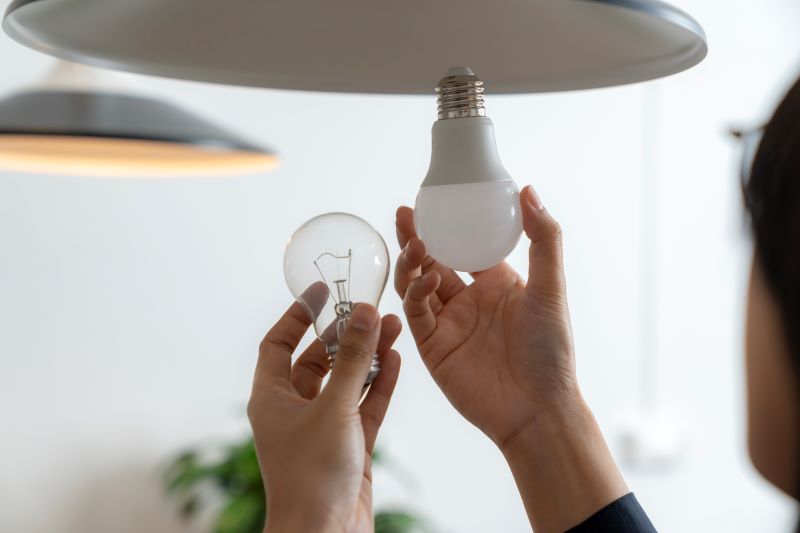Energy efficiency is a smart and sustainable way to use energy which can bring several benefits, such as financial savings, environmental benefits through reducing emissions and improved comfort and quality of life.
Energy efficiency measures can be applied homes, offices, businesses, industries, and transport.
Tips for energy efficiency in the home:

Heating and cooling systems are the largest energy user in homes accounting for almost 40% of household energy consumption. Here are some tips for using your heating and cooling in an efficient way:
- Maintain your thermostat between 18oC and 20 oC in winter and in between 25°C and 27°C in summer. For every degree increased for heating or cooling will increase energy use by 5%-10%.
- Try not to leave heaters or air conditioners running all night. Instead, use timers and automations where available.
- Use of fans together with heating and cooling units can make the process efficient by helping circulate the air.
- Dress appropriately for the weather, even in the home. i.e: if you are feeling cold, clothing such as socks, slippers, a cardigan and/or long pants can make you feel warmer and may save you from having to turn on, or turn up the heating
- Some modern fans have both summer and winter modes, check for a switch on the fan.
- Close doors of rooms that are not in use. Only heat or cool the rooms that you are using.
- If there are rooms in your house that aren't being used, or are used infrequently (i.e: laundry), switch off the heating and cooling to those rooms. Most modern central heating and cooling (i.e: ducted) can be isolated to the rooms in use, or the ducts may be able to be closed.
- Check for draughts in your homes, especially around doors and windows. Use draught stoppers on doors, and weather seals (i.e: silicone seals, adhesives and rubber fittings) in windows, skirting boards, skylights, and cornices to prevent any air leaks in houses.
- In winter, close air cooling ducts that are not use to prevent warm air escaping.
- Prevent heat loss or gain from windows by the use of well fitted blinds and curtains. Open curtains in winter to let the sun in during the day and close them before it gets dark. Close curtains during the hottest part of the day in summer.
- Reguarly clean or replace filters in heating and cooling units to maximise efficiency.
- Use natural heating and cooling methods by allowing warm or cool air flow through the house. In summer, allow air flow during the cooler times, and allow warm air in during the warmer times of day during the winter.
- Consider installing higher energy star rated systems while installing in a new properties or renovating or replacing.
The use of various appliances in homes accounts for 30% the total energy usage. Sometimes it can be a simple change in usage behaviour that make big differences in energy efficiency and create huge savings in the long-run. Here are some tips for boosting energy efficiency in the home:
- Look for high energy star ratings when purchasing new appliances. The initial cost of the appliance may be higher, but the savings over the life of the appliance can add up to be more than the purchase prices. The more the energy star ratings are, the higher efficiency.
- Avoid appliances that use standby power mode (i.e: televisions, computers etc), they still use power even if not in use. Try switching them off at wall.
- Use "eco mode" in appliances that are equipped with that feature. Eco modes usually run the appliances in efficient ways.
- If your home has rooftop solar panels, run your appliances such as washing machines, dishwashers, dryer etc during the day only. For those without solar panels, try shifting times to avoid running appliances during peak demand times.
- Use the washing machine in cold cycle and only when the load is full
- Only run your dishwasher when it is full and during off-peak times (i.e: at night)
- Hang clothes out to dry on the clothes line or a clothes airer, rather than using the dryer
- Set your fridge at an efficient temperature level, at or just below 50 C and your freezer at or just below -150C. Make sure there’s enough gap behind the fridge to support smooth air flow. Also, make sure the door seal is clean and in good condition. It should hold a piece of paper tightly in place when shut.
Hot water systems in houses usually accounts for 25% of total household energy use. Here are few tips to save money while running hot water systems.
- Set your hot water system to the optimal temperature level. The recommended temperature setting for storage hot water systems is 60 degrees, and instant hot water systems is 50 degrees
- Install efficient faucets and showerheads. It will not only save water but also save on energy for heating the water
- Turn off your hot water systems while going away for holidays
- Choose the right size heat pump hot water system for your household's needs
- Clean the filters regularly
- Use automatic settings were available
Most households would have either have gas or electric water heating systems. Recent advances in technology have seen a rise in uptake of heat pump systems, which are advanced electric heating systems that are much cheaper to run than standard electric options. Heat pump systems are even cheaper to run if you own rooftop solar.
Lighting systems a regular households account for more than 5% of the total energy usage. Here are few tips to save on lighting;
- Make use of natural light as much as possible. Use of lighter colours in the house will also reduce the need for artificial lighting
- Switch to LED light globes. LED have excellent energy efficiency, using up to 80% less energy than incandescent lights like halogen and fluorescent globes. LED lights also have longer lifespans which also saves on maintenance
- Turn the lights off when leaving a room that is not in use
- Some modern lighting options have sensors which can turn off the lights when a room is unoccupied, when building or upgrading consider a lighting system with this feature
- Make use of solar energy. Use solar outdoor lights where possible

Resources to check your energy
Sometimes its worth checking your energy plans and compare them with available offers in the market. There are various independent and free tools to do the comparisons. You can start comparing your energy plans at Energy Made Easy.
Please note that you will need a device connected to internet, a recent energy bill and some information about your household.
Home Energy Efficiency Kits
Wagga Wagga residents can now loan a Home Energy Efficiency Kit to audit energy and water efficiency in their homes. Individuals from the community can borrow the kit from Wagga Wagga City Library for a period of 28 days with a renewal at 14 days. The test results from the kits will prompt individuals to make minor yet impactful changes that can bring huge financially and environmental benefits.
For more information and request a loan of one of the Energy Efficiency Kits, head to Wagga Wagga City Library website.
More resources:
There is more information on how to be energy efficient via the Australian Government's Department of Climate Change, Energy, the Envrionment and Water webpages:
https://www.energy.gov.au/households
https://www.yourhome.gov.au/energy
https://www.dcceew.gov.au/energy/energy-efficiency/buildings/residential-buildings
